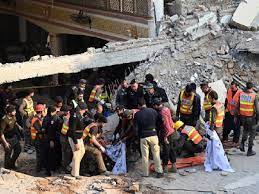Manas Dasgupta
NEW DELHI, Feb 2: Besides admitting that it was a major security lapse, the Pakistan police authorities are also suspicious that it could be an inside job to help the suicide bomber who got 101 people killed and scores of others injured in a blast in a mosque inside the police lines in Peshawar on Monday.
The suicide bomber had gone unchecked as he was wearing a police uniform and helmet when he staged the attack, a police chief said on Thursday. Hundreds of cops were attending the afternoon prayers in what should have been a tightly controlled compound in the northwest city of Peshawar on Monday when the blast erupted, causing a wall to collapse and crush officers.
The suicide bomber was believed to be in the first row of the officers offering the afternoon prayers when he detonated the explosives. “Those on duty didn’t check him because he was in a police uniform… It was a security lapse,” Moazzam Jah Ansari, the head of Khyber Pakhtunkhwa province police force, told a news conference.
The suicide bombing was the deadliest in a decade to hit Peshawar, a restive north-western city near the Afghan border. The bomber struck as hundreds of worshippers gathered for noon prayers in a mosque that was built for the police and their families living in a highly fortified area.
Police have a “fair idea” about who the bomber was after matching the head found severed from the body at the scene with CCTV images. “There’s an entire network behind him,” Ansari said, explaining that the bomber had not planned the assault alone.
Authorities are investigating how a major breach could happen in one of the most sensitive areas of the city, which houses intelligence and counter-terrorism bureaus and is next door to the regional secretariat. But the officials are also suspicious that the assailant may have received some assistance from inside the compound.
It was Pakistan’s deadliest assault in several years and the worst since violence began to resurge in the region after the Afghan Taliban takeover in Kabul in 2021. Authorities are investigating the possibility that people inside the compound helped to coordinate the attack, a senior city police official said. “We have detained people from the police line (headquarters) to get to the bottom of how the explosive material made its way in and to see if any police officials were also involved in the attack,” he said.
Pakistan Police investigating the suicide bombing said several people had been arrested, and they could not rule out the possibility that the bomber had internal assistance evading security checks. “We have found some excellent clues, and based on these clues we have made some major arrests,” Peshawar Police Chief Ijaz Khan said. “We can’t rule out internal assistance but as the investigation is still in progress, I will not be able to share more details.”
The police official said at least 23 people had been detained, including some from the nearby former tribal areas that border Afghanistan. The assault has put a scarred city on edge, harking back to more than a decade ago when Peshawar was at the centre of rampant terror activities carried out by the Pakistani Taliban (TTP) before a clearance operation flushed them into the mountainous border and Afghanistan.
Afghanistan while refuting the Pakistani allegation of having a hand behind the Peshawar blast has asked its neighbour to mind its own business. Amplifying that the two Muslim neighbours are not in friendly terms, Afghan Taliban Foreign Minister Amir Khan Muttaqqi said, “Pakistan should take care of its own problems and stop blaming Afghanistan for the Peshawar mosque attack.”
He too was suspicious that there could be much more in the suicide bombing than what meet the eyes. “In 20 years, we have not seen such a bomb or a suicide jacket that blew up the roof of the mosque and hundreds of people along with it. Therefore, this incident should be thoroughly investigated,” he said. Muttaqi added that Afghanistan should not be held responsible for Pakistan’s internal problems.
The minister also refuted Pakistan’s claims of his country being the epicentre of terrorism. “If someone says that Afghanistan was the centre of it, then the terrorism would have also reached Tajikistan, Uzbekistan, Turkmenistan and Iran. Yet that is not the case.” “Afghanistan today is at peace with other neighboring countries and that proves that there is no such thing as Afghanistan being the epicentre,” he said.
Investigators, who include counter-terrorism and intelligence officials, are focusing on how the attacker managed to breach the military and police checkpoints leading into the Police Lines district, a colonial-era, self-contained encampment in the city centre that is home to middle- and lower-ranking police personnel and their families.
The most active militant group in the area, the Pakistani Taliban, also called Tehreek-e-Taliban Pakistan (TTP), has denied responsibility for the attack, which no group has claimed so far. Interior Minister Rana Sanaullah had told parliament a breakaway faction of the TTP was to blame.
The TTP is an umbrella group for Sunni and sectarian Islamist factions opposed to the government in Islamabad. The group has recently stepped up attacks against police. Analysts say terrorists have become emboldened since US and NATO troops withdrew from Afghanistan and the Taliban swept into Kabul, with Islamabad accusing them of failing to secure their borders. Security forces have since become the target of increasing low-level attacks, often at checkpoints.
The assaults are claimed mostly by the TTP as well, as the local chapter of the ISIS, but mass casualty attacks remain rare. The TTP has distanced itself from the Peshawar mosque blast, claiming it no longer attacks places of worship. However, police said authorities were investigating whether an occasional affiliate of the group was responsible.

